#Grande Somalia
Text
27 febbraio 1927. In Somalia si concludono le operazioni per la pacificazione dei sultanati
Il 28 Febbraio 1927 il Governatore della Somalia Cesare Maria de Vecchi di Val Cismon emanava un comunicato nel quale dichiarava il termine delle operazioni militari e la compiuta occupazione dei sultanati in esecuzione della legge che gli aveva affidato l’incarico.Si chiudeva così il ciclo delle operazioni per la pacificazione della Somalia Settentrionale iniziato nel Settembre del 1925 e…
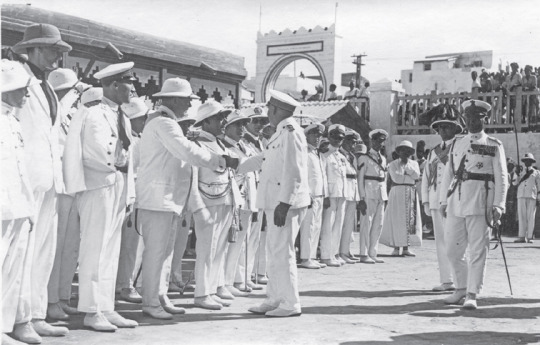
View On WordPress
#bande armate#benadir#de vecchi di val cismom#dubat#fascismo#Grande Somalia#nogal#pacificazione#somalia#sultanati
0 notes
Text
Abiy Asserts That Ethiopia's Population Of 150 Million Can’t Coexist In Geographical Prison
Ethiopia's PM, @AbiyAhmedAli has emphasized the importance of discussing the Red Sea issue in his first open comment to Ethiopian lawmakers. “#Zeila in #Somaliland [historical context] during the Ifat kingdom & proximity; the other option in #Djibouti;
Continue reading Untitled

View On WordPress
#Abiy Ahmed#Djibouti#Eritrea#Ethiopia#Grand Ethiopian Renaissance Dam (GERD)#Horn of Africa#Indian Ocean#Nile Dam#Ports and logistics#Red Sea#Somalia#Somaliland
0 notes
Text
Somalia is prepared to go to war to stop Ethiopia recognising the breakaway territory of Somaliland and building a port there, a senior adviser to Somalia’s president has said.[...]
Last Sunday its president, Hassan Sheikh Mohamud, called on Somalis to “prepare for the defence of our homeland”, while rallies have been held in Mogadishu, Somalia’s capital, against the agreement.[...]
Ethiopia and Somalia fought a conflict in 1977-78 over a disputed region and tensions still run deep. Ethiopia [at the time ruled by the US-supported TPLF] invaded Somalia in 2006 to dislodge [the ICU government] from Mogadishu, helping to spark the Al-Shabaab insurgency, and today it is one of the largest contributors of troops in the African Union peacekeeping force in Somalia.[...]
In an interview with the Observer, Somaliland’s foreign minister, Essa Kayd, said the port deal with Ethiopia will “legitimise our self-determination” and could spark a “domino effect” of other countries recognising the territory.[...]
However, there is confusion over the content of the deal between Somaliland and Ethiopia. Neither side has made the full text public.
When it was struck, Somaliland’s president, Muse Bihi Abdi, said Ethiopia had agreed to grant official recognition in return for a 50-year lease of a stretch of coastline, which it will develop for “naval and commercial” purposes. However, Ethiopia said it had only agreed to “make an in-depth assessment towards taking a position regarding the efforts of Somaliland to gain recognition”.
A western diplomat briefed on the deal described it as a “memorandum of misunderstanding”. “Ethiopia insists they did not agree to recognise Somaliland,” the diplomat said.
Kayd said the deal is based on Ethiopia granting recognition to Somaliland: “Without that, nothing is going to happen.” He added that discussions had been progressing “for years”. “Ethiopia needs sea access and we need recognition, so you can see how these needs can be dealt with.”[...]
On Thursday, Abiy’s adviser drew parallels between Ethiopia’s quest for sea access and its construction of the Grand Ethiopian Renaissance Dam, a potentially transformational hydroelectric project on the Blue Nile, which was built despite objections and military threats from Egypt.[...]
Mohamud visited Eritrea last week and is preparing to travel to Egypt. The countries are Ethiopia’s main regional rivals and have both expressed support for Somalia in the wake of the port deal. “Abiy sees this as a legacy issue,” said Boswell. “If this deal with Somaliland falls through, Ethiopia will try to find a port somewhere else, so this is going to shape regional dynamics for years to come.”
13 Jan 24
26 notes
·
View notes
Text
Ayaan Hirsi Ali is a national treasure and we are lucky that she emigrated to the US, barely fleeing her war-torn homeland of Somalia, and later, escaping woke political persecution in the Netherlands (yes, she was a Dutch Parliamentarian, forced to flee her own adopted Western country). One of her best friends, Theo Van Gogh (great grand nephew of Vincent Van Gogh) was assassinated by an Islamist in Amsterdam, right in front of his house. The 2 made a documentary together, one that focused on lack of rights for Muslim women and misogyny within Islam.
Ayaan Ali grew up a Somali Muslim, her family were devout Muslims, and she was forced to undergo genital mutilation at age 5. She escaped the grip of Islam at 23 by making her way to Netherlands in 1992, and 11 yrs later, in 2003, was elected to Parliament, where she served until 2006, at which time she suffered political persecution by Dutch islamists colluding with the left-wing political parties.
In 2005, Time magazine named Ali as one of the 100 most influential people in the world. In January 2006, Hirsi Ali was recognised as "European of the Year" by Reader's Digest,
Ali should not be ignored, as she knows more about Islam than 99.99% of us Westerners.

#ayaan hirsi ali#Hirsi Ali#Ayyan ali#islam#misogyny in islam#islamic misogyny#womans right in islam#lack of womens rights in islam#islamist#quran#somalia#netherklands#amsterdam#holland#America#United States#US#US assylum#Dutch#dutch assylum#israel#secular-jew#jewish#judaism#diaspora#American#anti islamist#dutch parliament#parliament#womens rights
18 notes
·
View notes
Photo

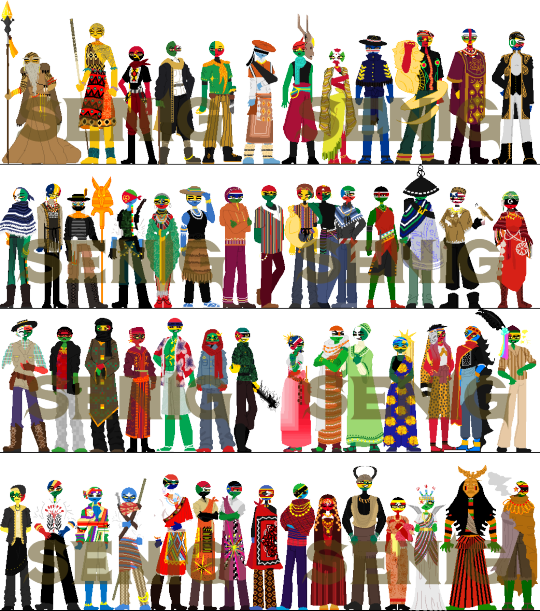





Al fiiiiiiinnnnnnn

(dibujo rápido :v)
Después de un año y medio intentando iniciar al continente Africano, por fin lo e terminado y con ello abro las demás posibilidades que no he podido hacer por querer terminar esto jejeje.
Bien iniciemos con los nombres. todos acomodados por abecedario.
África ( El anciano con lanza)
Nueva África (El del bastón)
Angola
Argelia
Benín
Botsuana
Burkina Faso
Burundi
Cabo Verde
Camerún
Centroafricana
Comoras
Costa de Marfil
Chad
Egipto
Eritrea
Etiopía
Gabón
Gambia
Ghana
Guinea
Guinea-Bissau
Guinea Ecuatorial
Kenia
Lesoto
Liberia
Libia
Madagascar
Malaui
Malí
Marruecos
Mauricio
Mauritania
Mozambique
Namibia
Níger
Nigeria
Ruanda
República del Congo
República Democrática del Congo
Santo Tomé y Príncipe
Senegal
Seychelles
Sierra Leona
Somalia
Sudáfrica
Sudán
Sudán del Sur
Suazilandia
Tanzania
Túnez
Togo
Uganda
Yibuti
Zambia
Zimbabue
Y como siempre tuve dudas con uno que aparecía, por lo que leí, es un estado de uno de los países, pero como no estaba segura lo quite.
Y ahora una historia. un poco larga seguir bajo su propio riesgo.
África era una persona con una personalidad tranquila por fuera, pero por dentro abundaba un ego enorme. No por nada era el hermano que simbolizaba el sol, tan grande en la galaxia y se burlaba de los demás.
Pero su ego nunca logro inquietar a su hermano Europa, los ojos de Europa iban mas haya, era la mismísima galaxia, a diferencia de su hermano que era un simple sol que brillaba sobre sus demás hermanos, pero no sobre Europa.
África tendía a ser grosero con sus tres hermano, era mezquino mientras ocultaba bajo una sonrisa maliciosa, Asia no le importaba, es mas lo admiraba, América le daba igual, le gustaba siempre estar rodeando a África, la que salía enojada y dañada era Oceanía, que siempre soportaba el desprecio de su hermano mayor y a veces Asia se le unía.
Pero ella no sufría por lo menos la represión como América y es mas, ella misma se desquitaba con América, como no podía hacer nada con África, desquitaba su odio con su hermano menos.
América era el menor y el mas joven, el era ingenuo y amaba a su familia sobre todas las cosas, aun si todo lo maltrataban y lo veían como una maquina para rellenar sus tierras con minerales.
África al inicio lo trato como todos, solo lo venia a ver para que América rellenara sus tierras, y cuando veía a América intentando crear algo por su cuenta, alguna historia algún dios, alguna estatua o pirámide, todos incluyendo África, lo destruían y lo menospreciaban. Solo era una maquina de minerales.
Hasta que un día, Europa decidió usar su poder del tiempo para ver el futuro cercano de su hermano menor, pero...no vio nada.
Europa tiene el don del tiempo, es su poder mas fuerte, y fue la razon de la perdida de la civilización de su padre, y terminando con el cuidando a sus hermanos. El puede adelantar el tiempo, y puede del el futuro a veces sin intenciones de verla, otras veces para anticipar algunos eventos, por lo cual se asunto al no ver a su hermano menor.
África y el hablaron.
-Segundo hermano, tenemos que hablar de algo importante...
-Hump, ¿y de que trata?, espero y sea importante, porque como veras, estoy iniciando la escritura, jajaja algo que tu no lograri...
-Yo ya sabia que ibas a hacerlo...
-grr...entonces que es, habla ya.
-Quiero que dejen de destrozarle las cosas a nuestro quinto hermano...
-Eh? de que hablas, no ves que si logra algo el ya no nos necesitara...
-Lo se, pero...segundo hermano...no lo veo...
-¿No ves que?
-Que no lo veo, no veo nada, veo oscuridad, vacío ninguna imagen, nada, lo entiendes...el no esta con nosotros en el futuro...
Ante esa idea, tanto Europa como África, empezaron a ser mas amables con América, pero el daño ya estaba echo, América no creaba nada, solamente se la pasaba pegado a sus hermanos y solo jugaba y comía, pero nada estaba creando para el mismo y la gente.
Así, fue tambien el inicio de las pelas.
Oceanía se volvió mezquina y insultaba a todos, mientras creaba un hacha para luego intentar golpear a los demás, hasta lastimando a los humanos.
Asia, presumido y perfeccionista, nada le gustaba y cada día era mas exigente, con otros y con el mismo, un arco y flecha de presunción, era su arma, la apuntaría tenia que ser perfecta, pero hasta eso lo criticaba.
África, una lanza alta y fina, con lo mejor en la punta, como el sol alta y orgullosa, como el, un orgulloso que nunca se equivoca y un ego que alcanzaba al sol, si alguien le pedía algo, siempre suplicando por vivir.
Europa era controlador, todo tenia que salir como el quería, si no, con una espada rápida y filosa que puede ser lo que quiera a la hora de lanzar el ataque, era su arma, un arma que simboliza protección pero tambien peligro.
Todos esos defectos, eran la causa de sus peleas, y llegaron tan lejos que iniciaron una separación realmente dañina.
O:¡TE DIJE QUE NO HICIERAS ESO!
E: AHORA ESM I CULPA, O TE HABIA DICHO QUE NO IBA A FUNCIONAR, YO PUEDO VERLO CON MIS OJOS, NO NECESITO NI SIQUIERA TENER QUE USAR MI PODER
O: ERES UN ESTUPIDO, TU ERES UN CRITICON COMO LOS OTROS DOS
AF: OH AHORA SOY YO EL PROBLEMA, PORQUE NO ERES OBEDIENTES Y TE SIENTAS COMO LA SEÑORITA QUE ERES
O: ERES UN INGRATO
AS: CUIDA TU LENGUA
O: PORQUE NO CUIDAN SU LENGUA USTEDES, DESDE QUE NACI NUNCA ME HAN TRATADO COMO PARTE DE ESTA FAMILIA, SIEMPRE ME HACEN A UN LADO Y ME GOLPEAN CUANDO NO LES HAGO CASO
E: ¿Que? SEGUNDO, QUE SIGNIFICA ESTO
AF: QUIERES PELEARTE CONMIGO, MIENTRAS TU IBAS A QUIEN SABE DONDE, YO ERA EL QUE TENIA QUE CUIDAR A ESTA INGRATA.
O:VES, ES LO MISMO, TODOS USTEDES SN IGUALES
Mientras discutían los 4, América los observaba desde lejos intentando que su voz alcanzara a sus hermanos, aun con todo lo que pasaba, la tierra temblaba, los volcanes hacían erupción, aparecían tornados y el mar creaba maremotos, América no podía parar de gritas, intentando hacer que sus hermanos lo vieran, pero América no pudo intento alcanzarlo corrió hacia ellos hasta que llego a la orilla y con su brazo izquierdo, sostuvo el otro lado de la tierra partida pero su brazo fue arrancada su propio cuerpo y todo se hizo un caos.
Cuando los 4 hermanos despertaron, y no encontraron al menor, solo su brazo con un montón de minerales que utilizaron para dar minerales por ultima vez a sus tierras, mientras se lamentaban por su hermano.
Después tres hermanos empezaron a morir, Oceanía fue la primera, despues Europa, y por ultimo Asia, dejando como ultimo a África. Pero este se negó a morir.
Aunque vivió toda su vida arrepentido, porque nunca pudo despedirse de ninguno y nunca pudieron resolver las cosas, todos se fueron, arrepentido, y uno nunca supieron que le paso, al principio el fue bueno, aprendió de sus errores y al final realmente cambio, pero cuanto mas seguía vivió algo en su interior empezó a pudrirse.
Su acciones se han vuelto confusas, muchas veces parece amable y gentil, pero realmente no es así. Y eso lo sabe perfectamente Egipto, su nieto.
África dejo sin poder a sus paises, todos siempre deben de obedecerlo, y ser como el quiere que sean, y aquellos que nacen con algo que a el no le gusta, los volvía a hacer, y así fue durante años, hasta crear perfectos paises, aunque solo con algunos defectos, el cual era sus ojos.
Los ojos de algunos paises africanos están ocultos, y nunca muestran sus ojos ante nadie, y menos a África, el odia todo color que salga de su gama, si no es dorado y variantes o negros, despídete de tus ojos, el único que nunca obedece a eso y se riesgo realmente fue Egipto, quien tiene unos ojos azules brillantes como el océano. aun cuando renace tras ser asesinado por su abuelo, este aun conservaba esos ojos azules, su piel cambio y no recordaba nada, pero el azul de su ojos se conservaba.
En áfrica las organizaciones creadas dentro de este, no tiene poder ni poder de decisión, todos tiene que pasar por África y quien se atreva a cuestionarlo, era brutalmente torturado por el propio continente y por la gente que lo adoraba.
Las paises femeninas no tienen poder en nada y son menospreciadas por áfrica, mientras que los masculinos eran cuestionados y maltratados físicamente por su osadía en muchas ocasiones, esos fueron los casos de Mozambique y Yibuti, quienes son inestables mentalmente y comúnmente son los títeres de África para espiar a los demás paises, para averiguar si traman algo.
pero luego se tuvo esperanzas al nacimiento de un nuevo África, pero este no quería quitarle el puesto al anterior, justificando cada acción y dejando la oportunidad de cambiar su tierra en vano.
El nuevo era amable, quería a sus primos hermanos, pero quería a su creador, y no podía ponerse contra el, aun si eso significaba dejar que todo ellos sufrieran.
Sur, conoció una de las caras de África, y cuando fue de nuevo pero hacia Egipto, este se preguntaba porque Egipto hablaba tan mal de África si era su continente. Y diciéndole que gracias a África no tienen que preocuparse por nada, no sufren de enfermedades ni heridas, ninguno de ellos tiene una marca tan notoria o heridas profundas o partes del cuerpo emputadas, Egipto solo le dijo que no era tan divertido como Sur piensa, y que ellos realmente no tienen verdadera libertad, son esclavos de su propio continente.
Hasta que Sur paso lo del 2013, que empezó a entender la historia de los continentes, y supo el porque prefirieron morir antes de seguir viviendo, y era...porque estaba corrupto, el continente era mas cruel y frio, fingiendo siempre bondad cuando en realidad era malvado.
Justicia le dijo a Sur que tras la muerte de Europa, ella fue a ver a África, y el lloraba por que ahora solo quedaba el, y se arrepentía de que nunca pudieron resolver todos sus problemas, todas esas peleas. Pero cuando Sur le pregunta sobre sus hermanos, África es frio, y se burla de ellos, Sur empezó a ver la verdad, y África ya no podía seguir siendo el líder del continente, que el nuevo tenia ya que ser el líder, y que el viejo tenia que irse, entonces intento Sur matarlo con el arma de la virtud de América, pero sin éxito, pues allí fue cuando se dio cuenta que el arma no servía en el Africano, solo el arma de África podía matarlo y solo alguien de África podía utilizarlo.
Al inicio Sur era respetuoso con el viejo África, pero ahora ya no, es mas le tiene un montón de sobre nombres ‘’ anciano’’ ‘’decrepito’’ ‘’vejestorio’’ ‘’basura’’ etc etc...
Y África, siempre lo termina golpeando, pero sus golpes pueden matar a Sur, por lo cual no sobre pasa la lineal algunas veces, otras veces Sur aprovecha la forma tan rara de actuar del viejo, que le hace preguntas del pasado, y aunque fue lindo con Sur y algunos Americanos por el parecido a su hermano perdido, Sur sentía lastima por los paises africanos, quienes no parecían felices, por lo cual tomo la decisión de ayudarlos, aunque el no puede hacer mucho, por eso se alianza con Egipto.
Lo cual es curioso, porque ambos tienen un contraste al color del continente, Sur tiene ojos rojos, y Egipto ojos azules, mientras que el espíritu es verde en América y África es amarilla.
_____________________________________
Bueno hasta aquí, espero y les guste y perdón por el texto largo, aunque luego podre una bitácora de Democracia que si será larguísima XD
Bueno me voy a dormir, ya son las 7 aquí en mi estado, y no e dormido nada XD
Que estén bien, y buen domingo =w=
121 notes
·
View notes
Text
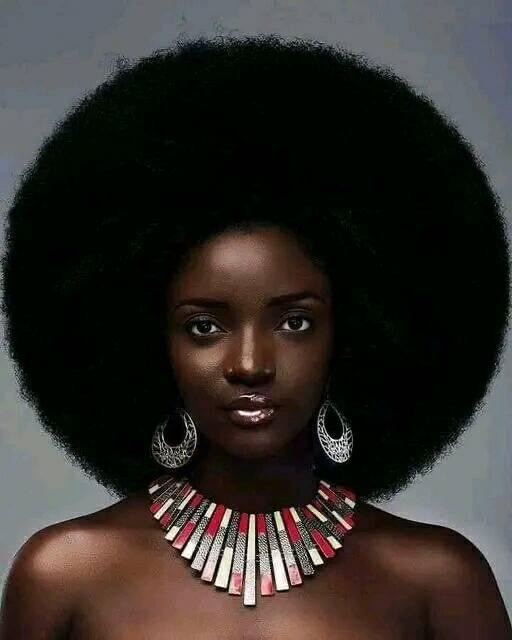
25 Top Facts about Eastern African countries
1. Ethiopia 🇪🇹 has the largest population of (114,963,588 people.)
2. Somalia 🇸🇴 has the largest coastline in the region.
3. Kenya 🇰🇪 has the highest GDP in the region.
4. South Sudan 🇸🇸 is the leading Oil Producing Country in the region.
5. Djibouti 🇩🇯 has the smallest population in the region.
6. Tanzania 🇹🇿 has the highest point in Africa, MT Kilimanjaro.
7. Ethiopia 🇪🇹 has the strongest military in the region.
8. Ethiopia 🇪🇹 has the largest Dam, Grand Ethiopian Renaissance Dam project in Africa.
9. Kenya 🇰🇪 has the largest desert lake in the world, lake Turkana
10. Uganda 🇺🇬 supplies electricity to Kenya, Tanzania and nearby DRC regions.
11. Rwanda 🇷🇼 has the cleanest city in Africa.
12. Burundi 🇧🇮 once had monarchs.
13. Ethiopia 🇪🇹 is rich with historical sites of king's castles and Emperor's Palaces.
14. Eritrea 🇪🇷 women population in Eritrea is 3 times that of men.
15. Ethiopia 🇪🇹 has the largest lion species on earth, the Barbary lion with dark fur on the neck
16. Sudan 🇸🇩, South Sudan 🇸🇸and Ethiopia 🇪🇹 have a long history dating back 3500 years ago.
17. Sudan 🇸🇩 has some ancient pyramids on its northern region.
18. 🇰🇪 🇺🇬 🇹🇿 Has Lake Victoria which is the largest fresh water lake in Africa.
19. 🇹🇿 And 🇰🇪 have serengeti and maasai mara home to the great migration and 8th wonder of the world.
20. Kenya 🇰🇪 Mombasa Port was the first port in the region to be established in 1896.
21. Somalia 🇸🇴 was the first country in Africa to produce a pilot.
22. In Uganda 🇺🇬, less than one dollar is enough to sustain you for a day.
23. Ethiopia 🇪🇹 had the strongest Emperor and Monarchs that made them resist Colonization.
24. Tanzania 🇹🇿, lake Tanganyika in Tz is the deepest lake in Africa,
25. Lastly the longest river in the world is river Nile which is estimated to be 30 million years old...
83 notes
·
View notes
Text

25 Key Insights into Eastern African Nations:
(1). Ethiopia 🇪🇹 boasts the region's largest population, with over 126 million people.
(2). Somalia 🇸🇴 holds the title for the longest coastline among Eastern African countries.
(3). Kenya 🇰🇪 leads in GDP within the region.
(4). South Sudan 🇸🇸 is the primary oil-producing nation in Eastern Africa.
(5). Djibouti 🇩🇯 has the smallest population in the region.
(6). Tanzania 🇹🇿 is home to Africa's highest peak, Mount Kilimanjaro.
(7). Ethiopia 🇪🇹 boasts the strongest military presence in Eastern Africa.
(8). Ethiopia 🇪🇹 is constructing the Grand Ethiopian Renaissance Dam, Africa's largest dam project.
(9). Kenya 🇰🇪 houses the world's largest desert lake, Lake Turkana.
(10). Uganda 🇺🇬 supplies electricity to Kenya, Tanzania, and parts of the DRC.
(11). Rwanda 🇷🇼 is renowned for having the cleanest city in Africa.
(12). Burundi 🇧🇮 once had a monarchy.
(13). Ethiopia 🇪🇹 is rich in historical sites, including king's castles and Emperor's Palaces.
(14). Eritrea 🇪🇷 has a female population three times larger than its male population.
(15). Ethiopia 🇪🇹 is home to the Barbary lion, the largest lion species with distinctive dark fur on the neck.
(16). Sudan 🇸🇩, South Sudan 🇸🇸, and Ethiopia 🇪🇹 share a history dating back 3500 years.
(17). Sudan 🇸🇩 features ancient pyramids in its northern region.
(18). Kenya 🇰🇪, Uganda 🇺🇬, and Tanzania 🇹🇿 share Lake Victoria, the largest freshwater lake in Africa.
(19). Tanzania 🇹🇿 and Kenya 🇰🇪 boast the Serengeti and Maasai Mara, famous for the great migration and considered the 8th wonder of the world.
(20). Kenya 🇰🇪's Mombasa Port, established in 1896, was the region's first port.
(21). Somalia 🇸🇴 was the first African country to produce a pilot.
(22). In Uganda 🇺🇬, less than a dollar can sustain you for a day.
(23). Ethiopia 🇪🇹's strong historical leaders resisted colonization.
(24). Tanzania 🇹🇿's Lake Tanganyika is the deepest lake in Africa.
(25). The River Nile, estimated to be 30 million years old, is the longest river globally.
[Photo credit: Devashot Photography]
3 notes
·
View notes
Text
Events 3.15 (after 1920)
1921 – Talaat Pasha, former Grand Vizir of the Ottoman Empire and chief architect of the Armenian genocide is assassinated in Berlin by a 23-year-old Armenian, Soghomon Tehlirian.
1922 – After Egypt gains nominal independence from the United Kingdom, Fuad I becomes King of Egypt.
1927 – The first Women's Boat Race between the University of Oxford and the University of Cambridge takes place on The Isis in Oxford.
1939 – Germany occupies Czechoslovakia.
1939 – Carpatho-Ukraine declares itself an independent republic, but is annexed by Hungary the next day.
1943 – World War II: Third Battle of Kharkiv: The Germans retake the city of Kharkiv from the Soviet armies.
1951 – Iranian oil industry is nationalized.
1961 – At the 1961 Commonwealth Prime Ministers' Conference, South Africa announces that it will withdraw from the Commonwealth when the South African Constitution of 1961 comes into effect.
1965 – President Lyndon B. Johnson, responding to the Selma crisis, tells U.S. Congress "We shall overcome" while advocating the Voting Rights Act.
1974 – Fifteen people are killed when Sterling Airways Flight 901, a Sud Aviation Caravelle, catches fire following a landing gear collapse at Mehrabad International Airport in Tehran, Iran.
1978 – Somalia and Ethiopia signed a truce to end the Ethio-Somali War.
1986 – Collapse of Hotel New World: Thirty-three people die when the Hotel New World in Singapore collapses.
1990 – Mikhail Gorbachev is elected as the first President of the Soviet Union.
1991 – Cold War: The Treaty on the Final Settlement with Respect to Germany comes into effect, granting full sovereignty to the Federal Republic of Germany.
2008 – Stockpiles of obsolete ammunition explode at an ex-military ammunition depot in the village of Gërdec, Albania, killing 26 people.
2011 – Beginning of the Syrian Civil War.
2019 – Fifty-one people are killed in the Christchurch mosque shootings.
2019 – Beginning of the 2019–20 Hong Kong protests.
2019 – Approximately 1.4 million young people in 123 countries go on strike to protest climate change.
2022 – The 2022 Sri Lankan protests begins amidst Sri Lanka's economic collapse.
2 notes
·
View notes
Text
Neanche un anno dopo la sanguinosa guerra di occupazione dell’Etiopia che Mussolini pomposamente definiva «conquista dell’Impero», gli invasori italiani erano ancora in pochi, e non dormivano bene. Militari e camicie nere, insieme alle «truppe indigene» arruolate in colonia, non avevano mai smesso di combattere e percorrevano in lungo e in largo il vasto entroterra alla caccia delle formazioni resistenti etiopiche ancora in armi. Gli altri, civili o in camicia nera, erano per lo più asserragliati nelle città, e ascoltavano con apprensione le notizie di «bande ribelli» pericolosamente vicine. La repressione della resistenza – eufemisticamente definita «grande polizia coloniale» ma in realtà fatta di uccisioni, villaggi bruciati e raccolti distrutti – dopo molti mesi pareva tuttavia aver dato i suoi frutti: molte formazioni erano state disarmate; i loro capi e componenti eliminati o deportati nel terribile campo di internamento di Danane, in Somalia.
Il neonato impero fascista pareva insomma sulla via di una lenta normalizzazione, quando gli occupanti ebbero un brusco risveglio. Il 19 febbraio 1937, Yekatit 12 secondo il calendario etiopico, Rodolfo Graziani, viceré d’Etiopia e governatore generale dell’Africa Orientale Italiana, era su un palco nella capitale Addis Abeba, nel pieno svolgimento di una cerimonia pubblica, quando due patrioti di origine eritrea, Mogus Asghedom e Abraham Debotch, lanciarono nella sua direzione alcune bombe a mano che uccisero sette persone e ne ferirono molte altre. Tra queste lo stesso Graziani, che venne portato via d’urgenza. Da parte italiana l’attentato produsse panico, vuoto di potere, confusione nella catena di comando, volontà di vendetta esemplare frammista alla necessità di riaffermare il prima possibile e senza dubbi l’autorità italiana. Conseguenza di tutto questo fu un massacro difficile da descrivere.
Nei momenti subito successivi al fatto, le truppe italiane presenti sul posto presero a sparare indiscriminatamente sulla folla. Fuori città, le truppe nei presidi ricevevano l’ordine di iniziare una marcia concentrica verso Addis Abeba sparando a vista a chiunque incontrassero e dando fuoco alle abitazioni etiopiche. Una camicia nera, in una lettera spedita il 30 aprile, raccontò così quella marcia:
Stupiti, partimmo anche noi dal nostro fortino, in pieno assetto di guerra, e seguiti da carri armati e motociclette con mitragliatrici: e percorremmo diecine [sic] di chilometri, sparando su qualunque individuo di colore che incontravamo, e massacrando, nelle stesse loro capanne, tutti gli indigeni che si trovavano sul nostro cammino.
Giunti alla periferia della città, di fronte agli agglomerati di tucul – piccoli edifici di abitazione – al cui interno si erano chiusi gli etiopici,
siccome non potevamo colpirli tutti a fucilate, i nostri ufficiali fecero mettere in azione i lancia-fiamme: così in dieci minuti facemmo divampare, come roghi, centinaia e centinaia di tuculs, nei quali c’erano donne, vecchi e bambini, che furono abbrustoliti…
Frattanto nella città, la massima autorità politica rimasta, il segretario federale del Partito nazionale fascista Guido Cortese, ordinò la rappresaglia sguinzagliando, letteralmente, la popolazione italiana. Operai, camionisti, civili e camicie nere, avuta carta bianca dal Partito, per tre giorni trasformarono la città in un girone infernale in un’orgia di brutalità che ha pochi paragoni nella storia del colonialismo europeo.
I diplomatici stranieri ce ne danno una testimonianza vivida nelle allucinate missive che spedivano nelle rispettive capitali. Il rappresentante statunitense Cornelius Engert il primo giorno della strage telegrafava a Washington:
I nativi sono stati picchiati e mitragliati indiscriminatamente e le loro capanne sono state bruciate. Bombe incendiarie sono state sganciate da aerei operanti nelle periferie della città, e attualmente si sente in tutta la città una buona dose di colpi di fucile e anche di cannone da campo. Le strade sono state ripulite dagli indigeni e tutti gli italiani, compresi gli operai civili, girano pesantemente armati.
E il giorno seguente aggiunse:
Dal momento dell’incidente, bande disordinate di lavoratori e camicie nere armati di asce, mazze o fucili hanno vagato per le strade e, con rivoltante ferocia, hanno ucciso tutti i nativi in vista, anche le donne.
Il diplomatico francese Albert Bodard lo definì un pogrom, riferendo che
I cadaveri sono così numerosi che non si possono eseguire degne sepolture; i corpi vengono ammucchiati e cremati sul posto dopo essere stati cosparsi di benzina. Interi quartieri di tucul abissini furono dati alle fiamme con lanciafiamme e bombe a mano. In vari casi gli occupanti indigeni, impossibilitati a fuggire, venivano bruciati vivi nelle loro abitazioni. Ogni notte, la città è circondata dalle fiamme. […] regna una grande confusione in cui camicie nere, truppe, e operai militarizzati sembrano lasciati liberi di agire a loro piacimento.
ancora:
Anche i camionisti inseguivano gli abissini con le loro vetture, o le lanciavano ferocemente contro i nativi per schiacciarli. Quando le vittime esitavano a morire, i manganelli aprivano i loro crani e riportavano alla ragione i recalcitranti.
Simile il racconto dei testimoni britannici:
Per due giorni e mezzo gli etiopi, ovunque si trovassero e qualsiasi cosa facessero, furono braccati, picchiati, fucilati, trafitti con le baionette o bastonati a morte. Le loro case sono state bruciate e in alcuni casi loro stessi sono stati respinti tra le fiamme per morire bruciati. Con questo massacro furono combinati bottino e saccheggio. I seguenti incidenti che sono riferiti da testimoni affidabili illustrano bene la condotta degli italiani. Una banda di otto camicie nere è stata vista picchiare con bastoni, apparentemente a morte, un etiope le cui mani erano state prima legate dietro la schiena. […] Un colonnello italiano ha fermato la sua macchina in una strada principale per buttare giù un gruppo di tre etiopi, un uomo e due donne. Dopo aver picchiato l’uomo si è scagliato contro la donna, ma notando l’auto di una Legazione straniera lì vicino ha desistito. […] Forse uno dei motivi principali dietro l’azione degli italiani era quello della paura, poiché in nessun momento dalla loro occupazione si sono sentiti sicuri.
Dopo tre giorni, quando giunse infine l’ordine di cessare le violenze, il bilancio delle vittime fu spaventoso: circa tremila morti, ma i calcoli più recenti effettuati da Ian Campbell hanno stimato un numero sei volte superiore, forse vicino alle ventimila persone.
[...]
3 notes
·
View notes
Text
Harnessing The Power Of GERD For Economic And Social Progress In Somaliland And Somalia
Access to cheap #electricity from #Ethiopia could be a game-changer for #Somaliland & #Somalia, bringing significant #economic & #social benefits to both countries. However, there are significant challenges that must be addressed in order to make this a reality.
Continue reading Untitled
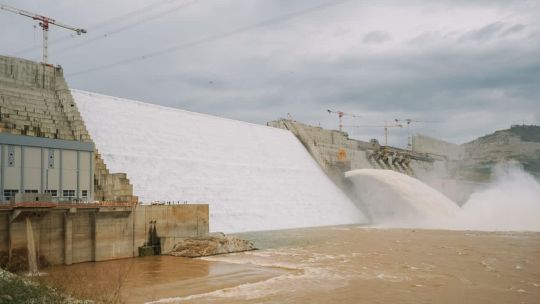
View On WordPress
#Ali Regah#Commentary#Economy#Electricity#Ethiopia#Grand Ethiopian Renaissance Dam (GERD)#Horn of Africa#Somalia#Somaliland
0 notes
Text
“Do not try Egypt, or try to threaten its brothers especially if they ask it to intervene,” he said.
“My message to Ethiopia is that … trying to seize a piece of land to control it is something no one will agree to,” el-Sisi said, noting cooperation on development was a better strategy.[...]
“It isn’t annexation or assumption of sovereignty over the territory of any state,” Redwan Hussien, national security adviser to the prime minister of Ethiopia, said in a post on [Twitter].
Relations between Egypt and Ethiopia have been tense for years over a major dam Ethiopia has built on the Blue Nile.
For over a decade — along with Sudan — the countries have been trying to reach a negotiated agreement on the filling and operation of the $4bn Grand Ethiopian Renaissance Dam.
The latest round of talks last month ended without a deal and Cairo and Addis Ababa traded blame for the failure.
21 Jan 24
23 notes
·
View notes
Text
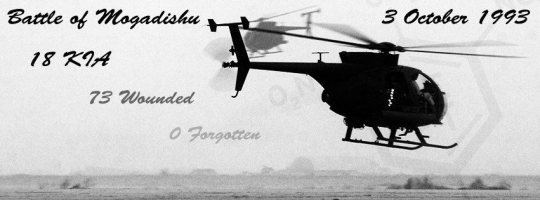


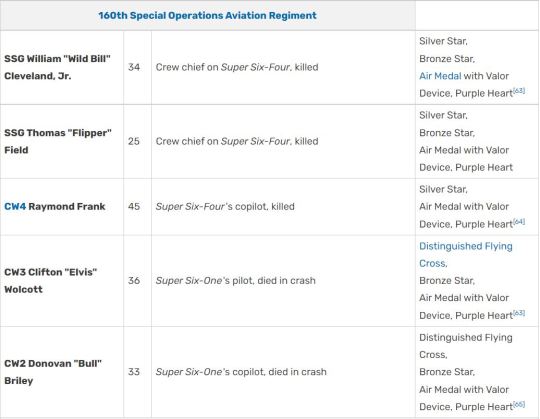

I would like to add the names of a group of Men from the 300th and 977th Military Police Companies who lost their lives in Somalia.
These Gentlemen were killed by a command detonated mine on August 8th, 1993.
I was a member of both of these units that kind of history has a weight to it that never leaves you.
Members of the 977th MP Company, Fort Riley, Kansas.
SPC Mark Gutting, age 25, from Grand Rapids, Michigan.
SPC Keith Pearson, age 25, from Tavares, Florida.
SGT Christopher Hilgert, age 27, from Danville, Indiana.
SSG Ronald Richerson, age 24, from Portage, Indiana, a member of the 300th MP Company, Fort Leonard Wood, Missouri. (Now Fort Riley KS.)
28 notes
·
View notes
Text
With the USSR, it was even easier to find a pretext for belligerence. Here was an empire of self-evident evil, and an atheist one at that. Its collapse created a gaping void for US grand strategists, who couldn’t help displaying a certain blasphemous nostalgia for their communist adversary. Just look at the names affixed to American military operations overseas. During the Cold War these were banal and arbitrary: the terrorist campaign against Castro’s Cuba was called Operation Mongoose; the mission to torture and assassinate members of the Vietcong was known as Program Phoenix; the bombardment of Cambodia, Operation Menu; Nickel Grass denoted the airborne delivery of arms to Israel during the Yom Kippur War; Praying Mantis the attack on Iran in 1988. Yet the register changed after the fall of the Wall. The 1989 invasion of Panama, Operation Just Cause, marked a new grandiloquence. In 1991, as the USSR crumbled, the US embarked on mission Restore Hope in Somalia, while Haiti saw the pinnacle of this Orwellian newspeak with operation Uphold Democracy in 1994. There followed Joint Endeavour in Bosnia (1995), Enduring Freedom in Afghanistan (2001), Iraqi Freedom (2003), and the classicizing Odyssey Dawn in Libya (2011).
If warfare in the communist era had a religious valence, in the post-communist world it became a question of morality – of humanity. We no longer speak of an Evil Empire but of ‘rogue states’. The enemy is to us what the criminal and gunslinger is to the sheriff. When we talk of ‘outlaw’ nations we embark, à la Carl Schmitt, on a ‘conceptual construction of penal-criminalistic nature proper to international law’: ‘the discriminatory concept of the enemy as a criminal and the attendant implication of justa causa run parallel to the intensification of the means of destruction and the disorientation of the theaters of war’.
Elsewhere, Schmitt notes that ‘to confiscate the word humanity, to invoke and monopolize such a term probably has certain incalculable effects, such as denying the enemy the quality of being human and declaring him to be an outlaw of humanity; and a war can thereby be driven to the most extreme inhumanity’. As we edge, like sleepwalkers, closer to the abyss of nuclear war, one can’t help recalling the words of the Nazi jurist (who didn’t seem to realise he was also talking about his own regime): ‘weapons of absolute annihilation . . . require an absolute enemy, lest they should be absolutely inhuman’.
The contemporary period, then, is marked by a yearning for the Crusades. But in European public opinion one can sense a certain apathy, a lukewarm resignation if not thinly-veiled scepticism: the kind one feels when watching a film one’s seen too many times. The media still denounces Putin’s atrocities and makes obligatory comparisons with the Hitlers and Stalins of the past, yet it does so with the enthusiasm of a bored schoolchild, almost as if le coeur n’y était pas. How many times have we woken up to the news that our former allies have suddenly become reprobates and criminals? How can we forget that Saddam Hussein was furnished with chemical weapons to use against Iran before he was designated a war criminal himself? Or that Bashar al-Assad was deemed reliable enough to torture prisoners at the behest of the CIA before he became a so-called international pariah?
It also strains credulity that the US wants to see alleged war criminals tried in an international tribunal which it does not even recognise; that it supports Israel’s illegal occupation and apartheid regime but refuses to tolerate Russia’s presence in Crimea and the Donbas; that it recognises the ethno-territorial grievances of Kosovar minorities in Serbia but not those of the Russophone minority in Ukraine, and so on. How can we take seriously the West’s invectives against authoritarian regimes, and calls to defend democracy, when our democratic leaders lay out the red carpet for a Saudi Prince who butchers critical journalists and an Egyptian General who executes political prisoners by the tens of thousands?
4 notes
·
View notes
Text
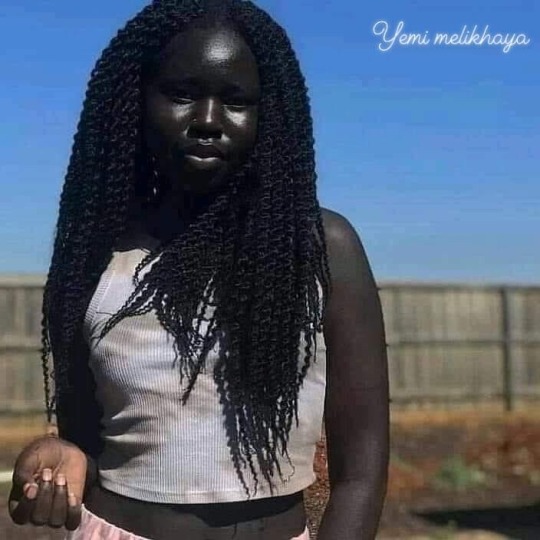
25 Top Facts about Eastern African countries
1. Ethiopia 🇪🇹 has the largest population of (126,527,060 people.)
2. Somalia 🇸🇴 has the largest coastline in the region.
3. Kenya 🇰🇪 has the highest GDP in the region.
4. South Sudan 🇸🇸 is the leading Oil Producing Country in the region.
5. Djibouti 🇩🇯 has the smallest population in the region.
6. Tanzania 🇹🇿 has the highest point in Africa, MT Kilimanjaro.
7. Ethiopia 🇪🇹 has the strongest military in the region.
8. Ethiopia 🇪🇹 has the largest Dam, Grand Ethiopian Renaissance Dam project in Africa.
9. Kenya 🇰🇪 has the largest desert lake in the world, lake Turkana
10. Uganda 🇺🇬 supplies electricity to Kenya, Tanzania and nearby DRC regions.
11. Rwanda 🇷🇼 has the cleanest city in Africa.
12. Burundi 🇧🇮 once had monarchs.
13. Ethiopia 🇪🇹 is rich with historical sites of king's castles and Emperor's Palaces.
14. Eritrea 🇪🇷 women population in Eritrea is 3 times that of men.
15. Ethiopia 🇪🇹 has the largest lion species on earth, the Barbary lion with dark fur on the neck
16. Sudan 🇸🇩, South Sudan 🇸🇸and Ethiopia 🇪🇹 have a long history dating back 35○○ years ago.
17. Sudan 🇸🇩 has some ancient pyramids on its northern region.
18. 🇰🇪 🇺🇬 🇹🇿 Has Lake Victoria which is the largest fresh water lake in Africa.
19. 🇹🇿 And 🇰🇪 have serengeti and maasai mara home to the great migration and 8th wonder of the world.
20. Kenya 🇰🇪 Mombasa Port was the first port in the region to be established in 1896.
21. Somalia 🇸🇴 was the first country in Africa to produce a pilot.
22. In Uganda ��🇬, less than one dollar is enough to sustain you for a day.
23. Ethiopia 🇪🇹 had the strongest Emperor and Monarchs that made them resist Colonization.
24. Tanzania 🇹🇿, lake Tanganyika in Tz is the deepest lake in Africa,
25. Lastly the longest river in the world is river Nile which is estimated to be 3○ milliòn years old...
Kindly click on the link to subscribe to our YouTube channel: https://youtube.com/c/HistoricalAfrica
10 notes
·
View notes
Photo

El Día Mundial del Rock se celebra cada año el 13 de julio, una fecha en la que los amantes del género recuerdan las bandas míticas que han dejado huella en el imaginario colectivo, como Queen, Pink Floyd, Metallica o ACDC.
¿Por qué se celebra el Día Mundial del Rock?
La elección de esta fecha fue para conmemorar el mega concierto benéfico Live Aid, llevado a cabo de forma simultánea en Londres, Filadelfia, Sídney y Moscú, en el año 1985 y en el que participaron las bandas de rock más grandes y emblemáticas del momento: Led Zeppelin, The Who, Black Sabbath, Queen, Sting, Judas Priest, Duran Duran, U2, Scorpions, Paul McCartney, Eric Clapton y Phil Collins, entre otros.
youtube
A mediados de los 80, las comunidades situadas en el cuerno de África vivían una situación de hambruna atroz, siendo Etiopía y Somalia los países más perjudicados. Casi un millón de personas perdieron la vida solo en Etiopía entre los años 1984 y 1985.
Ante esta situación, el actor y músico Bob Geldof quiso trabajar para crear un plan de ayuda a esta región del mundo, fundó la organización "Band Aid Trust" y empezó a darle forma a esta idea, que terminó llamándose Live Aid (traducido en español, Ayuda en Vivo). La causa consiguió la participación de artistas muy reconocidos.
El macroconcierto se desarrolló el 13 de julio de 1985 durante 16 horas en simultáneamente entre Londres y Filadelfia, siendo retransmitido en más de 72 países y convirtiéndose en uno de los eventos más seguidos de la historia.
Gracias a los artistas que tocaron y a los espectadores se consiguió recaudar 100 millones de dólares, que fueron destinados al fondo de ayuda a las víctimas de la hambruna del África.
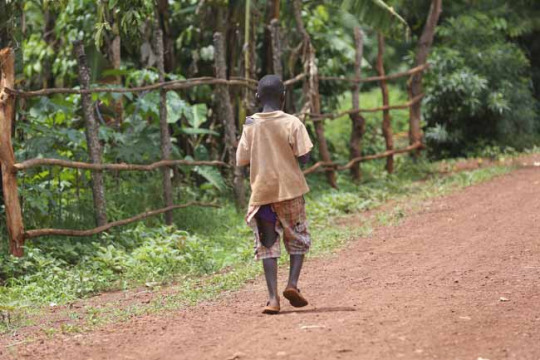
El evento traspasó fronteras y gracias a que la mayoría de los grupos que tocaron fueron de rock, se estableció el 13 de julio como el Día Mundial del Rock.
Los conciertos benéficos más memorables
Al igual que el Live Aid en los años 80, en la historia se han producido conciertos benéficos por distintas causas en los que las mejores bandas se han unido para conseguir un objetivo común. Estas son algunas de las citas más memorables que han tenido lugar en el mundo por causas benéficas:
The Concert for Bangladesh (1 de agosto 1971)
Organizado por George Harrison, en el Madison Square Garden, este evento pretendía recaudar fondos para la ayuda humanitaria en Bangladesh. Se recaudaron 250.000 dólares en el concierto y hasta 12 millones de dólares posteriormente con las ventas de la cinta del concierto.
We are the Word (1985)
Escrita por Michael Jackson, este título dio nombre al concierto benéfico para terminar con la pobreza en África y EEUU.
The concert for the New York City (20 de octubre de 2001)
Después de los ataques terroristas del 11M varios artistas dieron un gran concierto en el Madison Square Garden. Fue organizado por Paul McCartney y participaron más de 60 artistas.
Live 8 (2 de julio de 2005)
Este concierto se organizó para presionar a los líderes del G8 para que se comprometieran a combatir la pobreza en regiones como África. Participaron bandas como U2, Paul McCartney, Deep Purple, Coldplay, o Madonna. Y tuvo lugar en varias ciudades del mundo: Londres, Filadelfia, París, Berlín, Roma y otras.
Live Earth (7 de julio de 2007)
Organizado por el documentalista Al Gore tuvo lugar este concierto en distintas partes del mundo para crear conciencia sobre el cambio climático. Algunas de las bandas participantes fueron Génesis, Bon Jovi, Linkin Park, The Smashing Pumpkins.
Las mejores bandas de rock de la historia
Está claro que sobre gustos no hay nada escrito, pero si es cierto que existe coincidencia en nombrar a los mejores grupos de rock de todos los tiempos.
Podemos nombrar a unas cuantas bandas que a buen seguro te van a gustar. Somos conscientes de que no están todas y que el orden no es importante.

Queen
Banda británica conformada originalmente por Freddy Mercury como vocalista, Brian May como guitarrista, Roger Taylor como baterista y John Deacon como bajista. A pesar del fallecimiento de su líder, la banda sigue activa.
Rolling Stones
Banda británica fundada en 1962 por Brian Jones, Mick Jagger, Charlie Watts, Ian Stewart y Keith Richards.
Metallica
Los grandes del género trash metal, surgida en EEUU en los años 80 por Lars Ulrich y James Hetfiel (luego se unirían Dave Mustaine y Ron McGovney).
Pink Floyd
La banda londinense formada en 1965 está considerada como los precursores del rock progresivo y psicodélico, influyendo a artistas como David Bowie o The Edge.
ACDC
La banda australiana ha vendido más de 200 millones de copias en todo el mundo.
Led Zeppelin
Fundada en 1986 en Gran Bretaña, contando con la magistral voz de Robert Plant y la impecable guitarra de Jimmy Page. Una de las mejores bandas de los 70 con más de 250 milones de álbumes vendidos a la fecha.
The Beatles
Más de mil millones de discos vendidos en todo el mundo hablan por si solos, pero por si fuera poco diremos que la banda de Liverpool formada por John Lennon, Paul McCartney, George Harrison y Ringo Star cambió la industria musical y sentó las bases de la música pop.
Muchas más bandas vienen a completar la lista de las mejores de la historia, entre ellas, U2, Dire Straits, Guns & Roses, Rem, Aerosmith, The Who, Radiohead y muchas grandes.
youtube
15 notes
·
View notes
Text
En África encontraron algo tenebroso dentro de un meteorito somalí
Un equipo de investigadores han descubierto al menos dos nuevos minerales que nunca antes se habían visto en la Tierra en un meteorito de 15 toneladas encontrado en Somalia, el noveno meteorito más grande jamás encontrado.
Un equipo de investigadores han descubierto al menos dos nuevos minerales que nunca antes se habían visto en la Tierra en un meteorito de 15 toneladas encontrado en Somalia, el noveno meteorito más grande jamás encontrado.
“Cada vez que encuentras un nuevo mineral, significa que las condiciones geológicas reales, la química de la roca, era diferente a lo que se había encontrado antes”, dice…
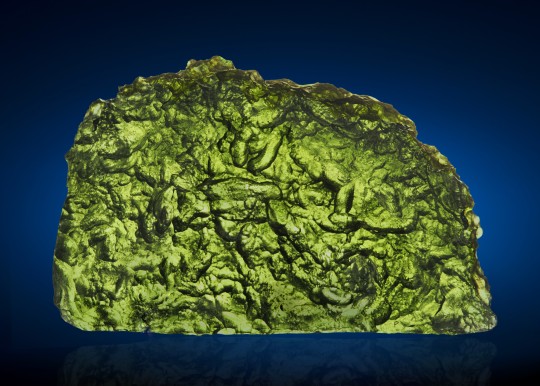
View On WordPress
2 notes
·
View notes